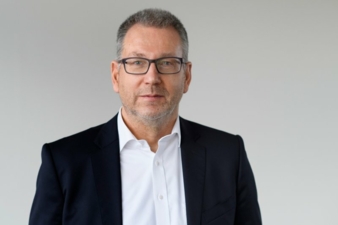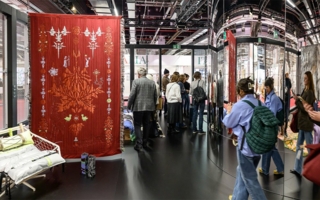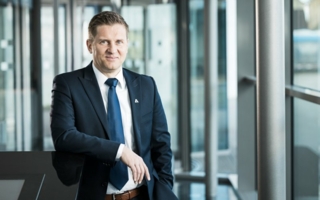01/06/2022 – Techtextil/Texprocess: Interview with Michael Jänecke — auf Deutsch lesen
Smart textiles are in demand
textile network spoke to Michael Jänecke, Director Brand Management Technical Textiles & Textile Processing at Messe Frankfurt, with regard to the upcoming Techtextil/Texprocess trade fairs.
It’s happening at last: Techtextil and Texprocess will be taking place in Frankfurt am Main again after a three-year break. textile network wanted to understand from Michael Jänecke, Director Brand Management Technical Textiles & Textile Processing at Messe Frankfurt, what visitors could expect, what the key topics would be and what he himself was most looking forward to.
textile network: In the last two years, various trade fairs had to be cancelled or postponed due to the coronavirus. At the fairs that did take place, the numbers of exhibitors and visitors were well down, at about 60% of the normal average. Now the pandemic is slowly subsiding and the restrictions are increasingly being lifted. Against that background, how many exhibitors and visitors are you expecting at the two fairs, Techtextil and Texprocess, in June?
Michael Jänecke: We’re delighted that at present we have some 1,300 exhibitors from 47 countries registered for the two fairs. These include twelve national pavilions from various countries. Despite the coronavirus restrictions that still exist in some countries, therefore, Techtextil and Texprocess can promise an international and multifaceted range covering all product groups and fields of application. The latest registration figures and a large number of discussions with customers tell us that exhibitors and visitors are all really looking forward to meeting up in person again and exchanging views, after a three-year break.
textile network: For the first time you are offering a Digital Extension so that visitors who are unable to travel to the fairs can participate virtually. What are the main features of this digital service?
Michael Jänecke: For the first time, exhibitors will be able to digitally extend their appearance at the fair and reach visitors by means of additional digital touch points. The virtual functions include matchmaking facilities, round table discussions, a chat function, 1-to-1 video conversations, web sessions and much more. Formats such as the Techtextil/Texprocess Forums can also be viewed as on-demand videos via the Digital Extension. The service goes live even before the fair, and is available from 13 June for preparation and arranging appointments, continuing during and after the fair itself until 8 July.
textile network: As well as the Digital Extension, Messe Frankfurt has developed other exciting innovations including the Denim Future Lab, for example. What will visitors get so see there?
Michael Jänecke: At the Denim Future Lab in Hall 8.0, visitors can discover the wide range of dynamic trends taking place in denim processing. Focusing on sustainability, various different processing steps will be presented, including eco-bleaching, eco-dyeing and upcycling, for example. And in Speakers Corner we will be providing an opportunity to get into discussion with experts from the denim industry.
textile network: What trends do you detect in the area of technical textiles? This is another area where sustainability is undoubtedly the driving issue of the sector...
Michael Jänecke: Yes, sustainability definitely continues to be gaining in importance in the textile industry, and will be a focal topic of Techtextil and Texprocess again this year. Interest in relatively local, resource-efficient production is growing ever larger: shorter transport routes, reduction of dependencies in the supply chain, not to mention automation and digitalisation of production processes are among the central issues. Over the course of the pandemic, this aspect has come increasingly to the fore. And of course it’s an important aspect in the development of new textile-based products and solutions for all industries in which technical textiles can be employed.
textile network: The Centre for European Economic Research (ZEW) expects the global market for smart textiles to surge to over €40 billion by 2030. What is your assessment of the way this field is developing?
Michael Jänecke: High-tech textile products are continuing to develop at a rapid pace. Smart textiles are in demand in many different areas of application – from the medical sector to clothing and beyond that into the mobility industry. Textile strain sensors, for example, are expected to be used in the adjustment of prostheses before long. Through Techtextil and Texprocess we are providing a platform on which textile innovations can be presented to the trade public, and of course that includes the field of smart textiles.
textile network: What's your own personal highlight at Techtextil/Texprocess? What are you particularly looking forward to?
Michael Jänecke: Above all, I’m particularly looking forward to meeting the exhibitors, visitors and journalists in person again at the Frankfurt exhibition area and having face-to-face conversations with them. At the same time, I’m excited to see the new ideas that exhibitors have been developing. Many of them have used the three intervening years since Techtextil and Texprocess 2019 to develop new technologies and materials.
My own personal highlights include the Techtextil/Texprocess Forums, where current and forward-looking topics are presented in talks, discussions and interactive formats.
At the Techtextil Forum, for example, you can find topics such as Strategy, Medical and Hygiene Textiles, Smart Textiles, Architecture, Biobased Materials and Recycling.
The Texprocess Forum, by contrast, offers talks about the key topics of Impact 4.0, the Future of Industry 4.0, Quality Management of the Future, Supply Chain Management, Digital Product Development and Sustainability Management.
At times like the present, with the textile industry facing major challenges, such an exchange of ideas and approaches to solutions is hugely important.
textile network: Herr Jänecke, many thanks for talking to us!




